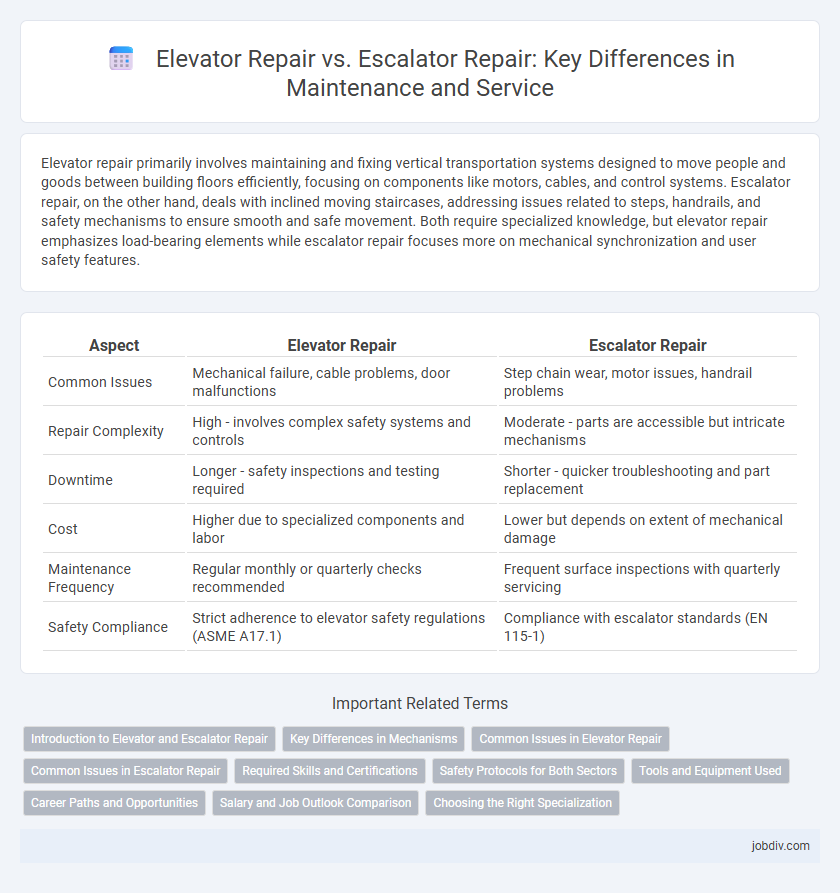Elevator repair primarily involves maintaining and fixing vertical transportation systems designed to move people and goods between building floors efficiently, focusing on components like motors, cables, and control systems. Escalator repair, on the other hand, deals with inclined moving staircases, addressing issues related to steps, handrails, and safety mechanisms to ensure smooth and safe movement. Both require specialized knowledge, but elevator repair emphasizes load-bearing elements while escalator repair focuses more on mechanical synchronization and user safety features.
Table of Comparison
| Aspect | Elevator Repair | Escalator Repair |
|---|---|---|
| Common Issues | Mechanical failure, cable problems, door malfunctions | Step chain wear, motor issues, handrail problems |
| Repair Complexity | High - involves complex safety systems and controls | Moderate - parts are accessible but intricate mechanisms |
| Downtime | Longer - safety inspections and testing required | Shorter - quicker troubleshooting and part replacement |
| Cost | Higher due to specialized components and labor | Lower but depends on extent of mechanical damage |
| Maintenance Frequency | Regular monthly or quarterly checks recommended | Frequent surface inspections with quarterly servicing |
| Safety Compliance | Strict adherence to elevator safety regulations (ASME A17.1) | Compliance with escalator standards (EN 115-1) |
Introduction to Elevator and Escalator Repair
Elevator repair involves maintaining and fixing vertical transportation systems designed to move people or goods between building floors, addressing components such as motors, cables, and control panels. Escalator repair focuses on the upkeep of moving staircases with mechanical steps that transport passengers between different levels, emphasizing step alignment, handrail operation, and safety switches. Both require specialized knowledge of electrical systems, safety regulations, and mechanical parts to ensure efficient and secure operation.
Key Differences in Mechanisms
Elevator repair involves servicing complex systems of cables, pulleys, and counterweights that move a cabin vertically within a shaft, requiring specialized knowledge of hoisting machinery and safety brakes. Escalator repair focuses on maintaining continuous belt-driven staircases powered by motors, chains, and step treads that move passengers at a consistent incline, necessitating expertise in conveyor mechanisms and step synchronization. Understanding these mechanical differences is crucial for accurate diagnosis and effective maintenance of either vertical transportation system.
Common Issues in Elevator Repair
Common issues in elevator repair include malfunctioning doors, faulty control systems, and worn-out cables or pulleys. Frequent problems such as jerky movements, unusual noises, and sensor errors often require diagnostic testing and precise mechanical adjustments. Regular maintenance prevents these issues and improves safety, reliability, and compliance with safety regulations.
Common Issues in Escalator Repair
Common issues in escalator repair include worn-out steps, malfunctioning handrails, and problems with the step chain or drive system. Escalator malfunctions often involve sensor failures and uneven step movement, which require specialized diagnostics and maintenance. Addressing safety compliance and mechanical wear ensures reliability and prevents accidents in escalator operation.
Required Skills and Certifications
Elevator repair technicians must hold certifications such as the OSHA safety standards and the National Elevator Industry Educational Program (NEIEP) certificate, with skills in hydraulic systems, cable maintenance, and electrical troubleshooting. Escalator repair specialists require expertise in complex moving stair components, motor systems, and safety sensors, often needing additional certification in escalator-specific safety protocols. Both roles demand rigorous knowledge of mechanical, electrical, and safety regulations to ensure compliance and operational efficiency.
Safety Protocols for Both Sectors
Elevator repair and escalator repair both require strict adherence to safety protocols to prevent accidents and ensure proper functioning. Technicians must follow industry standards such as OSHA regulations, use lockout/tagout procedures, and conduct thorough inspections of mechanical and electrical components. Regular training on hazard identification and emergency response is essential for maintaining safety in both sectors.
Tools and Equipment Used
Elevator repair typically requires specialized diagnostic tools such as multimeters, oscilloscopes, and cable tension meters to ensure precise assessment of electrical and mechanical components. Escalator repair relies heavily on lubrication equipment, step chain tension tools, and safety inspection devices to maintain smooth operation and user safety. Both repairs demand sturdy hand tools, but elevator repair emphasizes advanced electronic testing devices while escalator maintenance focuses more on mechanical adjustment instruments.
Career Paths and Opportunities
Elevator repair technicians specialize in maintaining and troubleshooting vertical transportation systems within buildings, offering career opportunities in residential, commercial, and industrial sectors. Escalator repair technicians focus on the mechanics and safety features of continuous stair systems, often requiring expertise in electrical and mechanical components specific to high-traffic environments. Both career paths provide strong job security and growth potential, with elevator repair typically offering broader scope in installation and modernization projects, while escalator repair emphasizes routine maintenance and safety compliance.
Salary and Job Outlook Comparison
Elevator repair technicians earn a median salary of approximately $84,000 per year, reflecting steady demand driven by ongoing infrastructure maintenance and urban development. Escalator repair specialists typically see slightly lower median wages around $78,000 annually, influenced by fewer new installations but consistent servicing requirements. Both occupations are projected to grow about 7% over the next decade, with elevator repair benefiting more from modernization trends in commercial buildings.
Choosing the Right Specialization
Elevator repair requires specialized knowledge of hoisting mechanisms, safety systems, and control panels, while escalator repair demands expertise in continuous belt movement, step chains, and handrail synchronization. Choosing the right specialization depends on the type of vertical transport system, frequency of use, and the specific maintenance challenges associated with either elevators or escalators. Professional technicians often undergo distinct training programs to master the unique mechanical and electrical components involved in each repair field.
Elevator Repair vs Escalator Repair Infographic

 jobdiv.com
jobdiv.com